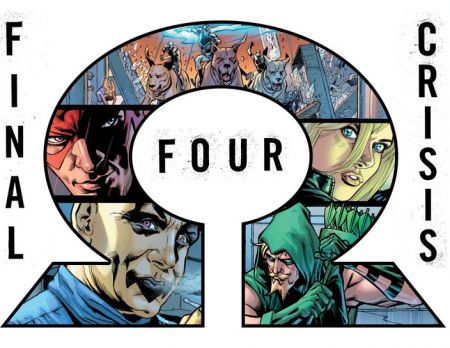Comics /
Spotlight
Citizen Activism, Whistleblowing and Comic Book Journalism
By Hervé St-Louis
October 23, 2008 - 03:50
On October 22, 2008, several comic book news Web sites received a series of email messages from a person anonymously providing “insider” information on the internal affairs of DC Comics. This person, revealed to the press a lot of information it claimed was truthful in order to damage the public reputation of several staff members of DC Comics. The blog where the person posted the messages initially has moved, but the messages have remained.
The reaction of one news outlet,
The Beat, published by
Publisher’s Weekly was to remove the entry that covered the claims of the person after rethinking the merit and intent of the anonymous DC Comics employee. The reaction of
The Comic Book Bin, was to decree that their contents would not be posted due to their libellous nature and the fact the they contravene with our internal policy about news covering.
The Comic Book Bin does not gossip.
As reporters, it is in the mandate of press outlets like
The Beat and
The Comic Book Bin to report on unofficial news sources and investigate leads that are newsworthy and inform the public, often to the chagrin of vendors and creators who would rather hush up unsavoury news information. From the looks of things, it seems that most of the industry will follow the lead of
The Beat and
The Comic Book Bin and provide no promotional platform to that blog. By doing this, are the reporters in the comic book industry failing their mandate to report on news? Are we protecting vendors and withholding precious information from the public?
It is a very delicate issue and requires much maturity to ascertain. Reporters have to weigh in the issues covered by whistleblowers and decided if the contents they present is still news worthy, although they can damage other people’s reputations.
On the DC Comics insider blogs, it is clear that this person has an agenda of denouncing the organization it works with. However, there is a clear pattern in the information posted by this person. It is meant to damage reputations as opposed to denounce a particular activity or business affair by the New York City-based publisher. The tone of the posts makes this information less legitimate and it is quite easy to question whether this person’s claims to be a DC Comics’ employee are true.
But gestures like these are more frequent than one expects in the comic book and related industries. For example, in response to a series of articles
The Comic Book Bin has written on the
privacy policies of Marvel Entertainment, a person claiming to work for Marvel Digital Comics Unlimited, the unit responsible for the online policies of the media company, posted responses to our articles defending their policies and offering vague answers to our concerns.
Still, as a journalist, I wasn’t convinced about the legitimacy of the comments posted under the articles. First, Marvel Entertainment failed to contact us directly. Marvel Entertainment has in its files my full address, phone number, and email address. Second, is was unusual for a company of the size of Marvel Entertainment to posts such messages. Third, if the legal department of Marvel Entertainment were involved in the comments, they would have spelled my name right. They used “St.Louis,” instead of “St-Louis.” Good lawyers never make such mistakes. Upon verification with Marvel Digital Comics Unlimited, they confirmed that they did not post the comments, which looked genuine. But due to their questionable source, we removed them nonetheless.
Similar comments were posted under an article
discussing DCDirect action figures and limited rights available that allowed DC Comics and DCDirect to make some action figures based on properties they owned. This time a person left comments, claiming to be Neil Gaiman and disagreeing with our article. Asking Neil Gaiman’s publicist to confirm or disapproved the legitimacy of that comment would have taken too long and we just assumed it was a fake comment by some comic book poster. We also debunked his own arguments that we had verified before we published the article.
In the case of the DC Comics insider, the Marvel Digital Comics Unlimited lawyers, and the pseudo Neil Gaiman, because it was not possible to verify the identity of the persons, we assumed they were not who they claimed to be. It’s easier to dismiss such posts. People still think that the Internet offers them anonymity and that they can post what they want and claim to be whomever they want and get away with it. Well, there are very easy ways to verify such claims, aside from asking the source to confirm their identity.
But what should the press do when they receive information through proper channels from whistleblowers and activists who clearly identify themselves, offer full contact information and serious claims? In such cases, it becomes a matter of whether the press finds the story newsworthy enough to cover.
 |
| Game Stop, owners of EB Games |
For example, on October 10, 2008, several news outlets, including
The Comic Book Bin, received a very detailed personal account claiming wrongful dismissal from Tom Waters, of Lancaster, New York. Waters was an ex-manager for EB Games and had worked with the company since 2002. He asserted that he and several middle managers at EB Games had been dismissed from the company. He carefully charted events, and offered enough information that a reporter wishing to investigate this story could have used to crisscrossed to EB Games and offer a whole perspective on this story.
The Comic Book Bin chose not to pursue this story, not because of merit, but because it dealt with a claim of wrongful dismissal. I have to admit that I’d rather cover a new video game being released, or the sales strategy of EB Games, than cover a “negative” story about human resources. Perhaps I failed in my duty to present stories that are involved with human resources and that ignoring them do a disservice to our audience. Perhaps not.
On the Waters’ story, I also felt that it was too local and not of interest or representative of systemic abuses by EB Games’ management across The United States. Similar termination happen every day in the comic book, action figure, film and video games industries. Is it the mandate of
The Comic Book Bin to report on them? I’m not sure.
Being a journalist, even on the Web, means that one becomes a gatekeeper. Information that get published on our site, automatically receives “sanctioning and legitimacy” whether it is in the interests or not of the person or company affected by the news story. Thus, there are great incentives from people gaining from such coverage to make it past the gatekeepers. In the case of the DC Comics insider, the fact that the information sent to the press is also available on a blog does not allow them to bypass the gatekeepers easily. If it were, that person would not have sought the assistance of the press in publicizing its agenda.
Last Updated: March 3, 2025 - 20:40


